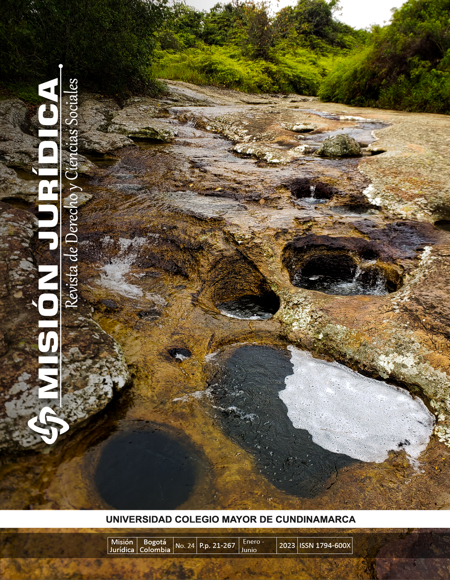The protest as an instrument to express thought in Brazil and Colombia and the interpretation of the Constitutional Courts and the Inter-American Court of Human Rights.
La protesta como instrumento de expresión del pensamiento en Brasil y Colombia y su interpretación por los Tribunales Constitucionales y la Corte Interamericana de Derechos Humanos
COPYRIGHT PROVISIONS
Every papper included in the magazine can be reproduced whole or in part, provided that respect for its original content, the source is acknowledged and is used with non-commercial academic. Legal mission and its content is protected under a license Creative Commons Attribution-Noncommercial-

Misión Jurídica is distributed under a Creative Commons Attribution-NonCommercial-NoDerivar 4.0 International License.
Based on a work in http://unicolmayor.edu.co/publicaciones/index.php/mjuridica/index.
Permits that go beyond what is covered by this license can be found at http://unicolmayor.edu.co/publicaciones/index.php/mjuridica/index.
Show authors biography
The present study analyzes how the protest act is based on the Legal Order in Brazil, Colombia and how their respective Constitutional Courts interpret it. It is also important to identify the legal nature of the right to protest, in particular as an instrument to express thought, opinion and claims aimed at improving state functions. Finally, the understanding of the dimension of the expression of thought by the Inter-American Court of Human Rights. The applied methodology was empirical, studying doctrinal and jurisprudential bibliographic material from both States, as well as from the decisions of the IACHR.
Article visits 116 | PDF visits 63
Downloads
- BONAVIDES, Paulo. MIRANDA, Jorge. AGRA, Walber de Moura. Comentários à Constituição Federal de 1988/coordenadores editoriais: Francisco Bilac Pinto Filho, Otávio Luiz Rodrigues Júnior. – Rio de Janeiro: Forense, 2009.
- COLOMBIA. Constituição Política da República da Colômbia. Disponível em: https://n9.cl/o5m99. Acesso em 09 de maio de 2021.
- COULANGES, Fustel de. A formação da cidade. In: A cidade antiga. Rio de Janeiro: Ediouro, 2004.
- DA SILVA, Mariane Vargas. Ativismo na Corte Constitucional Colombiana e a figura do “Estado de Coisa Inconstitucional”. Artigo Científico apresentado como exigência de conclusão de Curso de Pós Graduação Lato Sensu da Escola de Magistratura do Estado do Rio de Janeiro. Rio de Janeiro. 2015.
- MENDES, Gilmar Ferreira. BRANCO, Paulo Gustavo Gonet. Curso de direito constitucional. 13. ed. rev. e atual. – São Paulo: Saraiva Educação, 2018.
- LOURENCINI, Antônio Rogério. O preâmbulo e a Constituição. Franca/SP. 2017. Disponível em: https://n9.cl/f5t61. Acesso em 09 de maio de 2021.
- PROTESTOS NA COLOMBIA: Os gritos de uma Colômbia que explode nas ruas. Disponível em: https://n9.cl/psqtz. Acesso em 10 de maio de 2021.
- REALE, Miguel. Teoria Tridimensional do Direito. 5ª ed., Editora Saraiva, São Paulo, 2003.
- RODRÍGUEZ, Gloria Amaparo (2021). Yo Participo, Tú Participas, Otros deciden: La participación ambiental en Colombia. Friedrich-Ebert-Stiftung. Foro Nacional Ambiental. 1ª Edición. Bogotá. Febrero de 2021, p. 66-68.
- SAKAMOTO, Leonardo. Junho de 2013, o grito das ruas. Revista Istoé. Edição n. 2451. 25/11/2016. Disponível em: https://n9.cl/2b8ue. Acesso em 10 de maio de 2021.
- SCHERER-WARREN, Ilse. Manifestações de rua no Brasil 2013: encontros e desencontros na política. Cad. CRH vol. 27 no. 71 Salvador June/Aug. 2014. DOI: https://doi.org/10.1590/S0103-49792014000200012. Disponível em: https://n9.cl/pnw70. Acesso em 10 de maio de 2021.
- SILVA, Luciano Nascimento. Natureza Jurídica dos Prêambulos Constitucionais. Revista de Estudos Criminais. Vol. 4. Pág. 43.
















